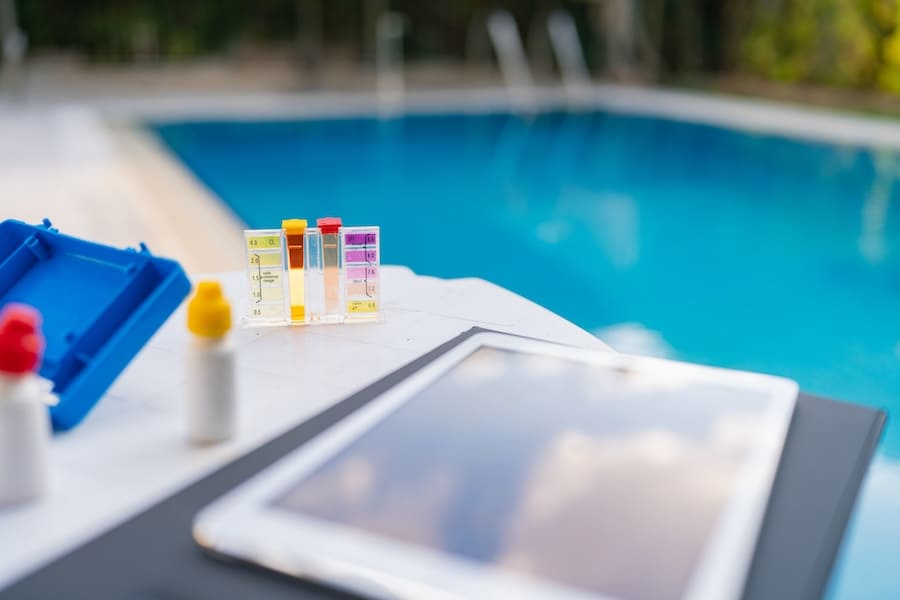Serving Scottsdale and Surrounding Areas
Pool Services
Thorough Pool Filter Cleaning Services
Pool Water Testing Services

Why Should You Test Your Pool Water?
Importance of Regular Pool Water Testing
It’s possible that you probably won’t change your pool water for multiple years at a time due to continuous filtration and disinfection, removing containments that keep the water enjoyable. That doesn’t necessarily keep your pool water balanced. A balanced pool has a proper pH level, total alkalinity, and calcium hardness. Having properly balanced pool water is important as untested and untreated pool water can accumulate harmful bacteria such as Salmonella, among other health concerns. Further, unbalanced pool water can lead to equipment damage, costing you more in repair or replacement parts. Here are our recommendations on how often to test your water for a balanced pool:
- Free Chlorine – This chemical helps prevent bacteria and algae growth. We recommend testing two-to-three times a week, with an ideal range of one-to-four parts per million.
- pH – An vital chemical that helps prevent swimmer discomfort while improving chlorine’s effectiveness and protecting your pool equipment. We also recommend that this be checked two-to-three times a week with an ideal range of 7.2-7.6.
- Total Alkalinity – It’s designed to help prevent your pH levels from swinging in and out of range, and it’s recommended to be tested weekly, with an ideal range of 80-150 parts per million.
- Calcium Hardness – Calcium hardness is there to help prevent surface damage such as scale and corrosion. Our team recommends that it be tested monthly with an ideal range of 80 to 150 parts per million.
- Stabilizer – Finally, the stabilizer helps extend the life of chlorine by preventing chlorine burn-off from sunlight. Our recommendation is that it be tested two-to-three times per season with an ideal range of 30-150 parts per million.
Contact Us
Common Pool Water Complications
General Pool Water Testing Tips
Keeping everything in our guide to pool water testing can be complex. That’s why we’ve compiled a list of some general tips when it comes to testing your pool water. Don’t hesitate to reach out if you are unsure what to do next or how to work a specific testing kit. We’ll work with you or get you scheduled for a visit to help ensure you have the tools to keep your pool clean and safe. Here are our general pool water testing tips:
- If you’re using at-home testing kits, always follow the provided instructions.
- When you test your pool water, you should be testing free and total available chlorine, pH, alkalinity, calcium, and sanitizer.
- Accurate water tests are recommended before adding any chemicals.
- Always take your water sample from elbow depth.
- Store your testing materials in a cool dark area, and ensure they aren’t expired before testing.
- Getting the results from a test can take some time. Reviewing the instructions and being aware of any possible complications before testing is best.

Give us a call today for a free, no obligation estimate.
Testimonials
What Our Clients Say
Contact Your Local Trusted Pool Water Experts
Our goal with this guide to pool water testing is to provide our customers with a detailed and easy-to-follow list of how to test and care for their pool water properly. The highly trained team at Patriot Pool and Spa wants to provide a worry-free experience through our various cleaning, repair, and consultation services. A smart customer is a good customer, and we want to share our expertise on how a pool works and what it requires. If, on the off chance, you need additional help or advice, don’t hesitate to reach out. With multiple locations throughout Florida and Texas, we’ll work with you to provide accessible, safe, and effortless results.


